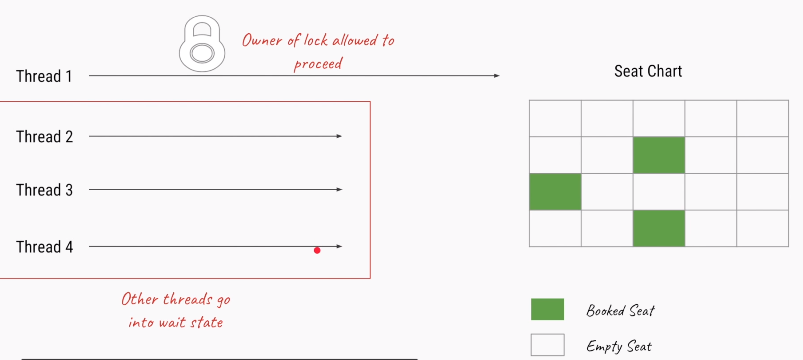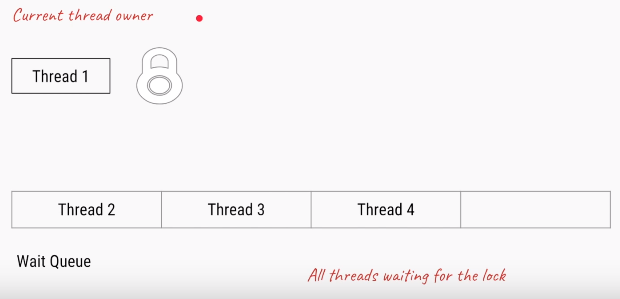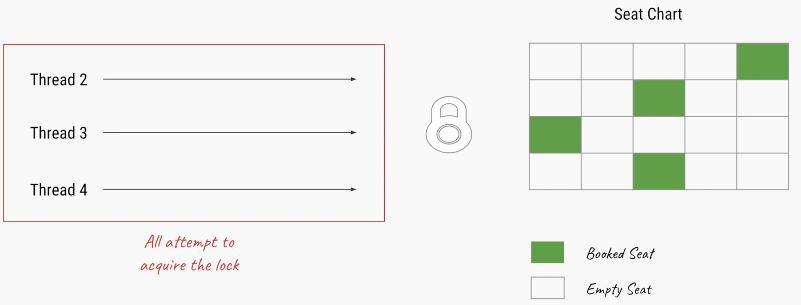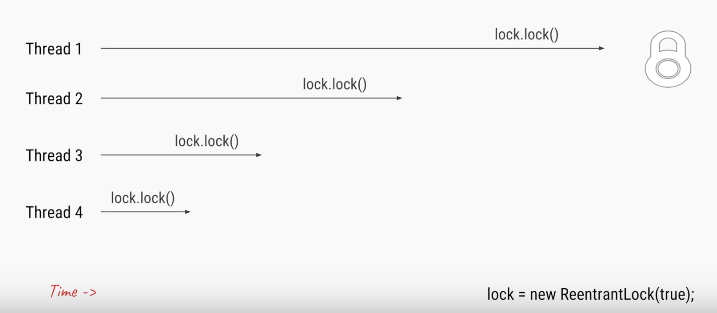java.util.Concurrency
java.util.concurrent package introduced in version 5.0 with following features
-
Lock objects support locking idioms that simplify many concurrent applications.
-
Executors define a high-level API for launching and managing threads. Executor implementations provided by java.util.concurrentprovide thread pool management suitable for large-scale applications.
-
Atomic variables have features that minimize synchronization and help avoid memory consistency errors.
-
ThreadLocalRandom (in JDK 7) provides efficient generation of pseudorandom numbers from multiple threads.
-
Concurrent collections make it easier to manage large collections of data, and can greatly reduce the need for synchronization.
Lock Interface
java.util.concurrent.locks.Lock interface is used to as a thread synchronization mechanism similar to synchronized blocks.

https://www.youtube.com/watch?v=ahBC69_iyk4&index=13&t=1s&list=PLhfHPmPYPPRk6yMrcbfafFGSbE2EPK_A6
1.In BookTicket only one thread is allowed to Book Ticket

2.Here Thread-1 get the lock, other threads will wait until in waiting Queu, t1 releases the Lock



3.Once Lock got released, remaiing threads will try to get the Lock. Process will continue.

Methods
1.void lock() – To aquire Lock.if lock is already availabale current thread will get that lock.if lock is not available it waits untill get the lock.it is similar to sysnchronized keyword.
2.void unlock() – Releases the lock.if we call on thread which is not having lock it will thorws runtime exception IllegalMonitorStateException
3.boolean tryLock() – To quire lock waitout waiting.if it aquires lock returns true, if not false & continues it execution without waiting.in this case thread never goes into waiting state
if(l.tryLock())
{//perform safe operations
}else{
//perform alternative operations
}
4.boolean tryLock(long time, TimeUnit unit) – Same as above, but specifying time.TimeUnit is Enum having values as NANOSECONDS,SECONDS,MINITUES,HOURS,DAYS
if(l.tryLock(1000,TimeUnit.MINITUES)) //waiting for 1000 minitues
{//perform safe operations
}else{
//perform alternative operations
}
5. void lockInterruptibly() – Aquires lock if available & returns immdefiatly. Not available it will wait.while waiting if thread is interruped then thread wont get the lock.
ReentrantLock Interface
it is the implementation class of Lock interface & direct child class of Object.Reentrant means A thread can aquire same lock multiple times without any issue.
In ReentrantLock maintians holdcount variable. when ever we call lock() it increments threads holdcount++ & when ever thread calls unlock() it decrements holdcount– value. Lock will realesed when ever count reaches 0.
1.lock on a resource more than once
ReentrantLock allow threads to enter into lock on a resource more than once.
When the thread first enters into lock, a hold count is set to one. Before
unlocking the thread can re-enter into lock again and every time hold count is
incremented by one. For every unlock request, hold count is decremented by one
and when hold count is 0, the resource is unlocked
2.offer a fairness parameter
after a thread unlocks the resource, the lock would go to the thread which has
been waiting for the longest time. This fairness mode is set up by passing true
to the constructor of the lock.
Lock lock = new ReentrantLock(true); //Setting Fairness Policy

Methods
It has all the methods which are thir in Lock interface, additoionally it has
following methods.
getHoldCount(): This method returns the count of the number of locks held on the resource
isHeldByCurrentThread(): This method returns true if the lock on the resource is held by the current thread.
NoramlLock Example
public class NormalLock extends Thread {
static int i = 0;
Lock lock = new ReentrantLock();
@Override
public void run() {
increment();
}
public void increment() {
try {
// WAIT FOR 2 Seconds to get the Lock
lock.lock();
i++;
S.O.P(Thread.currentThread().getName() + " Got Lock: incremented, i=" + i);
Thread.sleep(3000);
lock.unlock();
} catch (InterruptedException e) {
e.printStackTrace();
} finally {
}
}
public static void main(String[] args) {
NormalLock ob = new NormalLock();
Thread t1 = new Thread(ob, "One");
Thread t2 = new Thread(ob, "Two");
Thread t3 = new Thread(ob, "Three");
t1.start();
t2.start();
t3.start();
}
}
-----------------------------------
One Got Lock: incremented, i=1
Three Got Lock: incremented, i=2
Two Got Lock: incremented, i=3
Here all the Threads are excuted, because each thread will wait until they get the lock & in above we haven’t set fairness true, so order of thread excured randomly(1, 3, 2)
If we set fairness is true output is like
Lock lock = new ReentrantLock(true);
One Got Lock: incremented, i=1
Two Got Lock: incremented, i=2
Three Got Lock: incremented, i=3
Example : tryLock()
public class TryLockDemo extends Thread {
static int i = 0;
Lock lock = new ReentrantLock();
@Override
public void run() {
increment();
}
public void increment() {
try {
// WAIT FOR 2 Seconds to get the Lock
if (lock.tryLock(2, TimeUnit.SECONDS)) {
i++;
SOP(Thread.currentThread().getName() + " Got Lock: incremented, i=" + i);
Thread.sleep(3000);
lock.unlock(); // Unlocks here
} else {
SOP(Thread.currentThread().getName() + " Iam doing Something else");
}
} catch (InterruptedException e) {
e.printStackTrace();
} finally {
System.out.println("Final i : "+i);
}
}
public static void main(String[] args) {
// TODO Auto-generated method stub
TryLockDemo ob = new TryLockDemo();
Thread t1 = new Thread(ob, "One");
Thread t2 = new Thread(ob, "Two");
Thread t3 = new Thread(ob, "Three");
t1.start();
t2.start();
t3.start();
}
}
Three Got Lock: incremented, i=1
Two Iam doing Something else
One Iam doing Something else
Final i : 1
Here all thraeds trying to getlock, but Three Thraed got lock, remaining threads wont wait for lock , they are executing else block some kind of alternative job without waiting. So final count is 1.
HoldCount Example
package locks;
import java.util.concurrent.locks.ReentrantLock;
public class HoldCount extends Thread {
static int i = 1;
ReentrantLock lock = new ReentrantLock();
@Override
public void run() {
lock.lock();
System.out.println("one");
lock.lock();
System.out.println("Two");
System.out.println("HOLD Count : " + lock.getHoldCount());
lock.unlock();
System.out.println("isHeldByCurrentThread : " + lock.isHeldByCurrentThread());
System.out.println("HOLD Count : " + lock.getHoldCount());
lock.unlock();
System.out.println("HOLD Count : " + lock.getHoldCount());
}
public static void main(String[] args) {
HoldCount t = new HoldCount();
t.setName("BIG-THREAD");
t.start();
}
}
one
Two
HOLD Count : 2
isHeldByCurrentThread : true
HOLD Count : 1
HOLD Count : 0